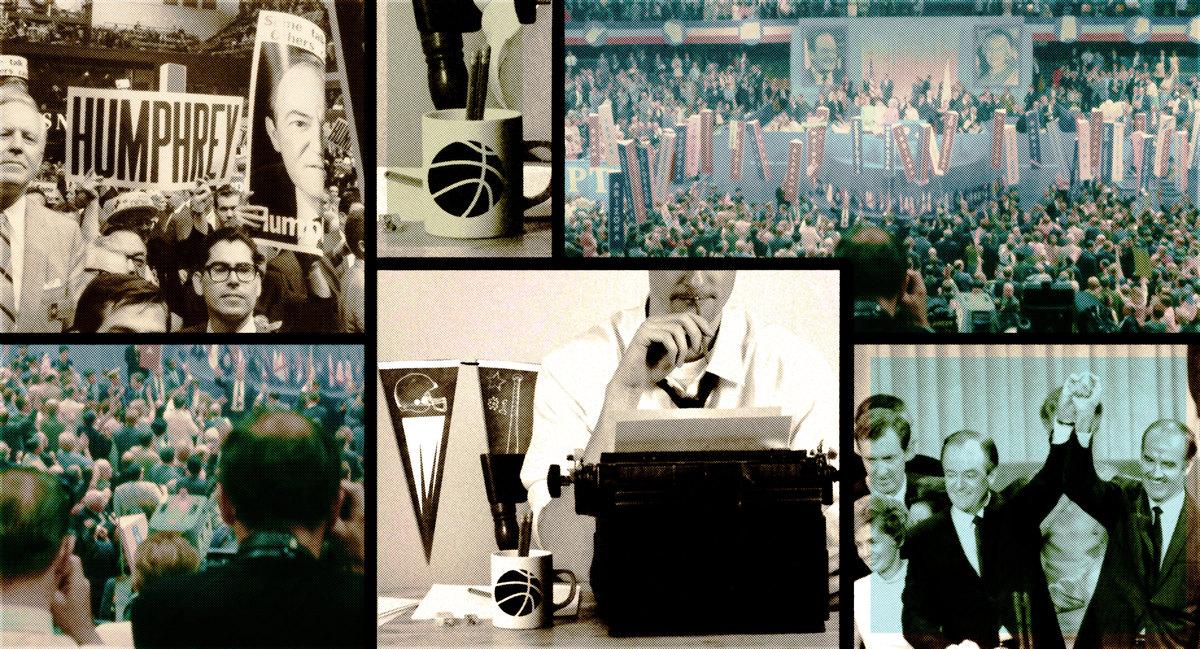
In 1968, Jerry Izenberg got attacked by a Chicago police officer holding a nightstick. Izenberg was a sportswriter. He had seen better swings. But the cop made good contact.
Izenberg was a sports columnist with the Newark Star-Ledger. He was the kind of swaggering local god who wore a trench coat in the newsroom. His Star-Ledger column, Jerry Izenberg at Large, was studied by writers far beyond the tristate area. That August, Izenberg’s editors sent him to Chicago to cover the Democratic Convention from (the paper’s house ad said) “the sports columnist’s viewpoint.”
“I’d done conventions before,” said Izenberg. “I didn’t know it was going to be like this.” At Chicago’s International Amphitheatre, Izenberg was listening to Democrats hunt for a consensus on Vietnam and for a candidate who could beat Richard Nixon. Then Izenberg got on the wrong side of one of Mayor Richard J. Daley’s finest. He doesn’t remember what he allegedly did, exactly. Maybe he used his press credential to get down to the convention floor and the policeman regarded that as being offside. The cop swung his nightstick, striking Izenberg’s left wrist. “For a couple years, I couldn’t wear my watch on that arm,” he said.
Last week, before Democrats went to Chicago for another convention, Izenberg, who is 93 years old, spoke on the phone from his home outside Las Vegas. Despite a biography filled with big numbers—he covered the first 53 Super Bowls—Izenberg is still a working sportswriter. He files to the Star-Ledger under the title of “columnist emeritus.” In May, he published a biography of Larry Doby. When his age comes up, Izenberg likes to say, “I’m old, not dead.”
Izenberg’s columns about the ’68 convention, the anti-war protesters who swarmed to it, and the cops who swarmed to them can be found in the Star-Ledger’s archives. They show what a good sportswriter can do when allowed to pinch hit on a big story.
In Chicago, it was the enormity of the story, and Izenberg’s status as a pinch-hitter, that triggered a professional crisis. Like a lot of sportswriters in the Trump era, Izenberg suddenly felt like his day job was far away from the real action. “I missed out on something,” he said. Izenberg wondered whether he’d devoted his writing career to the wrong subject, whether sports were a sideshow, and whether he should take his talents to the A section.
Asked why he went to Chicago in ’68, Izenberg said, “My job.” A sports columnist had more elbow room than anybody at the newspaper. He had one of the only jobs where you could really write. Three weeks before Chicago, Izenberg’s bosses sent him to cover the Republican Convention in Miami Beach, where he observed “a large audience cleverly disguised as semi-empty seats.” That line could be used to describe a Donald Trump rally during this campaign.
Chicago was full of sights for a wide-eyed columnist. Outside the city, Izenberg saw signs with the haunting message “Mayor Richard Daley Welcomes You.” At a hotel, Izenberg found Lester Maddox, the segregationist governor of Georgia.
Izenberg listened to the governor, then scuffed him up in print as he would the worst team owners. “Lester Maddox was there to meet with the Georgia delegation,” he wrote. “The Georgia delegation was still in an airplane somewhere above Chicago. Nobody is perfect.”
Izenberg compared Maddox’s oratorical style to that of a Wednesday speaker at an Optimist Club luncheon. “His left hand remains riveted in his pocket,” he wrote. “His right index finger points whenever it feels uncomfortable.” Two years later, Izenberg met Maddox again when Izenberg went to Atlanta to cover a fight between Muhammad Ali and Jerry Quarry.
In 1968, the Democrats came to Chicago without a nominee. It was the kind of open convention political writers dreamed about this year before Kamala Harris started making phone calls. Just about every Democrat in 1968 got their arm twisted: to support or oppose the nomination of Vice President Hubert Humphrey, to support or oppose the war.
Izenberg found the few Democrats whose arms remained untwisted: the delegates from the island of Guam, who were being completely ignored.
“Guam remains firm,” the delegation’s leader told Izenberg.
“Who’s trying to un-firm you?” Izenberg asked.
“Nobody,” the man said, “but someday we’ll change all that.”
There, you can see Izenberg using a sportswriter’s device in political reporting. You can get good quotes from the bottom of the roster.
One of Izenberg’s best columns, published on August 28, was about the “strange, leaderless army” of Robert F. Kennedy supporters. Kennedy was running for the Democratic nomination when he was assassinated in Los Angeles, less than three months before the convention. (This year, his son, Robert F. Kennedy Jr., is running for president on a platform of vaccine skepticism and roadkill disposal.)
Izenberg found a man who quit his job at a bank to work for Kennedy and shuck what the man called his “noninvolvement.” He met the vice president of Notre Dame’s student body, who had driven across Indiana with Kennedy during the primary. He described the reverence Kennedy’s supporters had for their candidate, even in the afterlife. Another supporter, the former lightweight boxing champ José Torres, told Izenberg, “Bobby Kennedy was not afraid of poor people.”
Prowling the same Chicago streets as Norman Mailer, Izenberg saw signs of a wounded country. Martin Luther King Jr. was assassinated in Memphis two months before Kennedy. The North Vietnamese began the Tet Offensive three months before that. In August, President Lyndon B. Johnson’s approval rating bottomed out at a Biden-esque 35 percent. Johnson had declined to run for reelection, leaving a hole at the top of the Democratic ticket.
Inside the International Amphitheatre, Izenberg watched a Vietnam platform fight between hawks and doves, between state delegations aligned with different sides. A delegate from Oklahoma was accidentally hit in the head with the Missouri state flag. “For a brief second,” Izenberg wrote, “Hanoi was in far less danger than St. Louis.”
Humphrey and the pro-war faction would eventually win out. After the fight over the platform, a singing contest broke out in the hall. The house band played “You’re a Grand Old Flag.” The New York delegation sang “We Shall Overcome.” Izenberg noted that the house band’s union musicians clocked out promptly at the end of their shift, awarding the W—at least on the musical front—to the doves.
As the week wore on, the story in Chicago became the violence of Richard Daley’s blue-helmeted police force. Izenberg, who was 37 that summer, had tweaked anti-war protestors in his column: for their hair, for their high-handedness. At one point, two anti-war groups couldn’t find any pro-Humphrey forces to shout at. “So it shouldn’t be a total loss, they turned on each other,” Izenberg wrote.
In 1967, Izenberg had defended Muhammad Ali when he was stripped of his title for refusing to enter the draft. Izenberg’s column might have been new to the Star-Ledger’s A section, but he knew who to blame for the violence in Chicago. “These are his police,” he wrote of Daley. “You cannot tie their actions this week to any other police force this side of Prague.”
Izenberg noted that so much tear gas drifted into the lobbies of the Conrad Hilton and Blackstone hotels that you could smell it in the carpets. (The former was the site of Trump’s recent meltdown with the National Association of Black Journalists.) Izenberg wrote that Daley’s actions were being approvingly watched by Bull Connor, the Alabama segregationist and “a professor emeritus of fire-hose psychology.”
“I’d written columns in the middle of riots many times,” Izenberg said over the phone. “I’d been under the [boxing] ring and written columns. But the town just went nuts.”
He continued: “I’m standing with the former governor of New Jersey’s wife, Helen Meyner”—who was on assignment writing social columns for the Star-Ledger—“in front of the Blackstone, explaining to her why she’s crying, because of the tear gas.”
“And bang! The picture window at the Blackstone coffee shop shatters as a kid runs right through it, with glass shards sticking out of his forehead and two cops chasing him with clubs,” he said.
Izenberg never mentioned his own clubbing in the paper. “I am not the story,” he said. “The story is the story. We got a lot of guys who don’t know that. And we had a lot of guys who didn’t know that.” Careful readers of Jerry Izenberg at Large might have noticed this sentence: “The cops are out to set a mid-America record for reporters beaten all the way into the emergency wards.”
On the night of Wednesday, August 28, Daley’s police reached what Izenberg called their “club-swinging zenith” on Michigan Avenue. As The Washington Post would later note, “They clobbered men and women, protestors and innocent bystanders, reporters and photographers.” In footage shown on TV, the crowd was heard chanting, “The whole world is watching!”
Izenberg’s last two dispatches from Chicago were pretty raw. He was working from a moral plane that a sports columnist reaches only in rare circumstances. He recorded Daley bellowing, “This is Chicago! This is America!”
“Charitable people,” wrote Izenberg, “say that at best he was half right.” His next column was back in its usual spot on the Star-Ledger’s sports page, next to a story about golf’s Thunderbird Classic.
Izenberg once got some advice from the sportswriter W.C. Heinz. Heinz clawed his way out of newspapers to write magazine articles and books. He told Izenberg not to become a “seven-inning writer.” Meaning, don’t get trapped on the sports page and leave your ambitions unfulfilled.
The things Izenberg saw and wrote about in Chicago made him feel a similar angst. His last column before the convention had been about Pittsburgh Steelers kicker Bill Shockley. The sports beat seemed very small.
After leaving Chicago, Izenberg went to Mort Pye, the Star-Ledger’s editor. He told Pye he wanted to move to a general news column. He wanted to write about big events head-on instead of admitting such events into his sports column.
Izenberg was feeling a jolt of the same professional insecurity many sportswriters experienced during the Trump era. It was as if they were writing about comparatively unimportant stuff, their hot takes were wasted on bad draft picks, and, maybe more to the point, they were missing out on an opportunity another expat of the sports beat would take on.
Pye said Izenberg could switch to a general column, then changed his mind. “He came to me in the end and said, ‘You’re too valuable. We have to have you in sports.’ I said, ‘If I’m that valuable, fuckin’ pay me more!’ I didn’t get the money, but I stayed in sports,” Izenberg recalled.
Today, Izenberg still files columns to the Star-Ledger’s sports page. Asked if he ever felt a pang when world events made sports feel small by comparison, Izenberg said, “Oh, yeah, very often. When I had something to say, which was almost every day.”
After some years, Izenberg reached a kind of internal consensus that eluded the Democrats in Chicago. In the summer of 1968, going back to sports might have seemed like a safe choice, a cop-out. But being a conflicted sportswriter, one with an abiding suspicion he was doing the wrong thing, was a way of stretching the job to its limits.
Over the next six decades, Jerry Izenberg at Large was the home to more stories about Muhammad Ali (“one of my five best friends in the world,” Izenberg once called him), labor, and Grambling State football, along with finely written columns about the Super Bowl and World Series. “I think I am a seven-inning writer,” said Izenberg.
Izenberg showed that sportswriting can be journalism’s best compromise, provided the writer doesn’t compromise too much. When he got back from Chicago, balky wrist and all, Izenberg’s first column was about ABC’s coverage of the Summer Olympics. Those were the Games in which Tommie Smith and John Carlos stood on the podium, raising their fists in the air.

